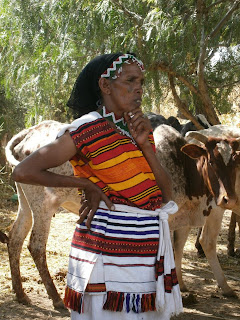ADDIS ABABA, Ethiopia – Addis Ababa means ‘New Flower’ in Amharic, Ethiopia’s ancient national language, and the name still seems apt despite the capital’s 21st century sprawl. New, modern buildings are under construction throughout the city, while a youthful populace fills its streets and squares. And the flower of the country’s rich culture is constantly in bloom here, from the hospitality of traditional tea ceremonies to the warm greetings of friends and strangers alike.
| Children perform for IFAD workshop participants on a field visit to Ethiopia’s Fentale District. © IFAD/Mark Forrest |
Which leads to one of the biggest questions facing Africa today: To ensure their own food security and to feed a rapidly growing population – including the inhabitants of Addis and other teeming cities – how can its farmers sustainably boost their productivity in the years ahead?
Proven approaches
With this question in mind, coordinators from IFAD-supported projects in Ethiopia and 16 other countries in East and Southern Africa gathered in Addis this week for their annual regional workshop. The 200-plus participants convened to exchange practical knowledge and experiences. Hosted by IFAD’s country office and the Government of Ethiopia, they spent four days taking a clear-eyed look at lessons learned from working with smallholders at the grass roots.
| Regional workshop participants convene in Addis Ababa. © IFAD/Mark Forrest |
But the discussions in Addis also confirmed that the rural poor in East and Southern still face great obstacles. Like Ethiopia itself, which is home to scores of distinct ethnic groups and languages, the region is extremely heterogeneous. It includes several of the fastest growing economies in the world, along with some of sub-Saharan Africa’s poorest and most fragile states. Rising food prices and underdeveloped markets, as well as inadequate roads and irrigation systems, pose serious challenges for smallholder households.
‘On the right track’
IFAD Regional Economist Geoffrey Livingston and Regional Director Périn Saint Ange acknowledged these and other challenges in their comments at the Addis workshop. Yet both speakers found solid grounds for optimism.
| IFAD Regional Director Périn Saint Ange addresses workshop in Addis Ababa. © IFAD/Mark Forrest |
Saint Ange pointed to reforms in policy and governance that have begun to ease trade barriers in the region. At the local level, he said, poor rural people – and particularly women and youth – have gained a greater voice in making decisions about their futures. He went on to remind participants that IFAD’s regional portfolio, which now stands at US$1.3 billion, will grow to US$1.5 billion by 2015.
In addition, Saint Ange said, up to US$100 million in grant funding will be available for innovative projects addressing the impact of climate change under IFAD’s new Adaptation for Smallholder Agriculture Programme.
“Agriculture has the greatest potential for transforming the lives of the rural poor,” he concluded.
Beyond business as usual
Still, there was a widely shared recognition in Addis that IFAD-supported operations must step up their efforts and results in order to achieve such a transformation. The message was clear: Overcoming regional challenges and meeting IFAD’s ambitious targets for rural poverty reduction will mean reaching well beyond business as usual.
 |
| Shunda Wata, chairperson of a rural women's credit cooperative visited by workshop participants in Oromia, Ethiopia. © IFAD/Timothy Ledwith |
“We are good at this, but we can do more and better,” Saint Ange said. “We are encouraged by the success that we are having on the ground. It is not enough, but the glass is filling quickly.”
Moving forward
There was no shortage of ideas in Addis about how to do more. From sessions on more rigorous project design and analysis to debates about linking agricultural research directly to ongoing projects, the participants maintained a spirited dialogue throughout the workshop.
And that spirit extended from the meeting rooms to the field, via a series of visits to projects in the areas around Addis. The visits provided a first-hand look at rural finance, irrigation and pastoral community development projects supported by IFAD in Ethiopia, as well as direct meetings with the people served and empowered by these initiatives.
“In Africa, the spirit of sharing is homegrown,” IFAD’s Ethiopia Country Director, Robson Mutandi, said as the workshop wrapped up yesterday. “We can never move forward if we are not open about our programmes.” Mutandi thanked everyone in attendance for engaging in an open discussion – in effect, for letting 100 flowers bloom in the ‘New Flower’ of Africa. “Let’s hope that together,” he said, “we can make this big challenge of moving rural people out of poverty a success.”

















